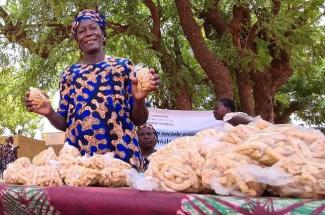Building Bridges Between Displaced and Local Women in Diapaga
- Pobindo Couldiaty, Diapaga Women Departmental Coordinator
Since 2001, the Women's Center in Diapaga, Burkina Faso has organized vocational training for women and girls, teaching sewing, weaving, and other income generating activities (IGAs)—courses that directly contribute to women's empowerment in the commune. The center has also provided women with a place to gather and discuss common issues and problems over the years. However, despite the center’s usefulness, the facilities deteriorated and community stakeholders stopped renting meeting rooms, significantly reducing the center’s ability to generate the income necessary to maintain it.
In response, the USAID Office of Transition Initiatives’ (OTI) Burkina Faso Regional Program (BFRP) worked with the Departmental Coordination of Diapaga Women, a local community group that promotes women’s rights and manages the center, to rehabilitate and equip it in March 2021. BFRP rehabilitated the main building, refurbished the center’s outer wall to increase security, restored its water source and mill, built a storage room and vegetable drying area, installed solar panels, and provided a seed-press machine for processing oil and juice. To ensure the proper management of the facility and its equipment in the future, BFRP also conducted maintenance training for the center’s management committee members. Local authorities, including the Head of the Prefecture and the Mayor of Diapaga, civil society organizations, and community members attended the center’s reopening ceremony and expressed gratitude to BFRP for bringing it back to life.
The Women's Center plays a critical role in bringing the community together. In recent years, violent extremist organizations have caused population displacements, many of whom are women, that affect Diapaga. These internally displaced persons (IDPs) often flee their homes with little resources. They are also stigmatized when arriving in Diapaga because the local population perceives IDPs as harbingers of violence and a drain on limited, valuable resources, creating tension between host community and IDP women. However, the rehabilitated Women's Center provided space for women from both groups to share their experiences and learn and conduct IGAs together, which helped improve relations between IDPs and the host community.
Pobindo Couldiaty, the Diapaga Women Departmental Coordinator, remarked on the improvements and said, "Now the center contributes to building a bridge between displaced and indigenous women in Diapaga. BFRP wiped away our tears, because now we can carry out our local production activities here without difficulty and in complete safety. We already have orders for our products, and we will soon be economically autonomous."
Building upon that progress, the Women's Center, in coordination with the Departmental Coordination of Diapaga Women and supported by BFRP, facilitated five discussions focused on peaceful coexistence in April and May 2021. These sessions discussed topics related to IDP women's access to marketplaces, social events, water sources, mills, health centers, and other public places, all of which are potential flashpoints for disagreements and tensions. In total, the sessions gathered a diverse group of 80 women from the five districts of Diapaga, 40 of whom were IDPs. Afterwards, the women worked together to use the newly equipped center to make products such as soap, pomades, drinks, and processed foods.
Kafaliba, an IDP and session participant explained, "The time we spent at the Woman's Center for the discussion sessions allowed us to forge more relationships [between displaced and local women] and to work together for the production of soaps and other products."
The Departmental Coordination of Diapaga Women then organized the Diapaga Women's Fair for Social Cohesion in May 2021 to showcase and sell these products to community stakeholders, including local authorities.
"This fair allowed us to sell our products, to meet other people, and above all to show the positive impact of our discussions between women. Today, displaced and host women work together and do wonders…Thanks to BFRP for making our dreams come true," said Couldiaty.
The rehabilitation of the Women’s Center, and the subsequent discussion sessions, courses, and other related events directly tied to the facility, underscore the key role communal spaces play in bringing communities together to achieve common ground and understanding in tense living situations.
https://www.usaid.gov/stabilization-and-transitions/burkina-faso

USAID/OTI/BFRP
